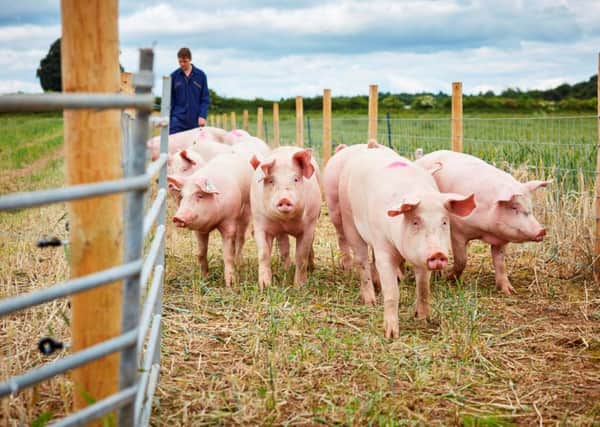Yorkshire to be '˜among best in Europe' for pig research


With finances looking healthier, an announcement of millions of pounds being ploughed into pig production research in Yorkshire this last week should only swell the feelgood factory.
According to the University of Leeds, Yorkshire will soon become one of the best places in Europe for pig research.
Advertisement
Hide AdAdvertisement
Hide AdTwin investment from the university and the Government means new facilities will open at the university’s farm to allow academics to carry out research into outdoor-reared pigs, while its indoor-reared pig research centre is also in line for a major upgrade.
A total of more than £7m is being lavished on the project, which Professor Helen Miller, director of the university’s farm, believes can bring benefits across the British pig industry.
“We are making the investment to create new knowledge which will benefit both British pigs and the pig industry,” Prof Miller said.
“Animal feed is the largest variable cost which the industry bears.
Advertisement
Hide AdAdvertisement
Hide Ad“One of the areas we will study in this new facility is how to improve outdoor sow nutrition to maximise the well-being and productivity of individual animals. This should also result in improved profitability, providing significant support for individual farmers and for larger businesses across the rural economy.”
Leeds’ pig research focuses on themes identified by the livestock industry as central to improving quality and productivity, namely: animal nutrition, production systems and reproduction, behaviour and environment.
As part of the cash investment, the number of sows at the university farm will increase from 200 to 600, of which 200 will live outdoors. This, the university said, will put the facility on a par with commercially run pig farms and will create a step change in the type of research the university’s academics can carry out.
New equipment and facilities that will be added to the university’s farm as part of the investment project will include: a CCTV network to monitor the pig herd round the clock; equipment to automatically feed and monitor what each pig eats; devices to let pigs choose what they want to eat, and monitor their choices; technical facilities to identify each pig genetically through its DNA; teaching centres and on-site laboratories to complement high-spec campus laboratories, and new animal accommodation including flexible penning and birthing arrangements.
Advertisement
Hide AdAdvertisement
Hide AdAmong the most prominent outcomes of the new investment will be a greater ability for researchers to make feed recommendations for pigs to keep pace with ongoing genetic improvements.
The university is recruiting new staff to open up new areas of expertise and the most high profile addition to date is Prof Lisa Collins, an epidemiologist who has developed computer models to predict animal behaviour, and who will join in January from Lincoln University.
Prof Miller said the new facilities and staff will help elevate the university to “a unique position in the UK” that will rival European leaders in the same field of research.
The investment in the farm’s facilities is mainly funded by the university. Additional support is from the government-funded Centre for Innovation and Excellence in Livestock (CIEL), a UK-wide programme which links leading livestock research bodies with industry partners, to improve livestock quality and husbandry across the board.